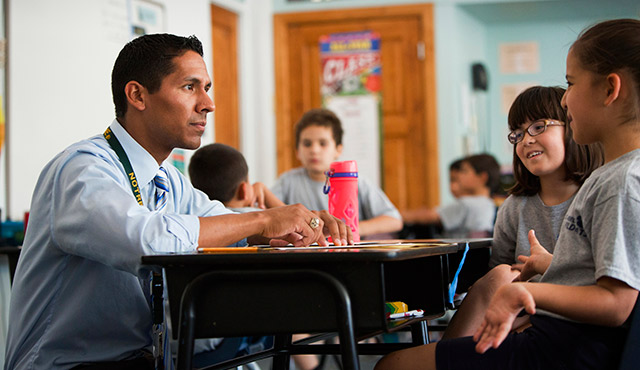When excitement began building over the latest “Avengers” film, educators at Christ Cathedral Academy in Garden Grove used the opportunity for another lesson in faith.
They asked students: “How do you become ‘The Avenger’ of your faith?”
It’s something that still resonates with her students, says Debbie Vallas, Senior Administrator at Christ Cathedral Academy.
“We’re not speaking from the Roman times or archaic times,” Vallas says. “We’re teaching them how to relate this to everyday life. You love ‘Star Wars.’ Well, what is ‘The Force’ about? It’s about good. The darkness is about evil. Everyone loves the ‘Avengers’ and superheroes. It’s taking the symbolic things in life and equating that to your faith.”
For the Catholic schools of the Diocese of Orange, teaching the centrality of faith to its 15,000 students extends beyond religion classes.
“You don’t just teach faith. You live faith,” says Greg Dhuyvetter, Superintendent of Schools. “The faith experience is not a single thing but a 360-degree experience.”
While each grade level has a designated religion class, the Catholic faith is woven throughout the curriculum, from language arts and science to math and social studies, where social justice issues are addressed. A developmental approach is taken, starting from fundamental teachings of the faith at the grade school level to deeper theological study at the high school level.
Classroom prayer is practiced regularly, spiritual retreats are offered and daily classes are covered in a way that is fundamentally favorable to the faith, Dhuyvetter says.
“We live in an imperfect world and plenty of things happen all the time,” he says. “There is a constant effort to guide students within the philosophy and understanding of our Catholic faith. It’s not one thing. It’s everything.”
The goal is to strengthen a school’s Catholic identity and create opportunities to engage in the faith, including global and community outreach to help those in need, Vallas says.
“To teach the faith, you have to live the faith,” she says. “It’s one thing to give them the foundation but they have to practice it.”
To do that, faith-based teaching has to extend to teachers, administrators and especially parents, says Sally Todd, Associate Superintendent of Schools.
“Faith formation begins at home,” Todd says, adding that the religious textbook series being used at schools include a strong parental component that encourages the discussion of faith with their children.
“We can’t do it without the parents,” Todd says. “We can only do so much and the stronger the faith is at home, the stronger the enhancement will be internalized with students.”
Vallas says she benefitted from a family who conscientiously practiced the faith.
“It had a huge effect on my life,” says Vallas, a Catholic school principal for 24 years. “I’m always coming from the perspective of Jesus. What would he think of you? What kind of decisions would he make? It gave me the strong foundation in life. It’s part of who I am and I want that for all the children in our Catholic schools.”
Technology is also used as a tool to teach faith in schools, whether it’s learning more about the canonization of Father Junipero Serra or livestreaming Pope Francis’ visit to the United States, an event that allowed students to watch other faith followers gather to see their spiritual leader.
“Technology is our new window to catechesis,” Todd says. “All of those things make our faith real in schools and within our students.”
Vallas agrees. “The Church responds to the people of today,” she says. “We are always finding ways to bring our curriculum and make it alive in who we are today. We try to give them that ‘live faith experience’ every day. Faith is a 24/7 thing.”
The Catholic schools of the Diocese of Orange teach the effective use of technology as a vehicle for learning and practicing the faith, Dhuyvetter says.
“We have been aggressive in our use of education technology so we can use it to show them the good things they can do,” he says.
For Dhuyvetter, the goal is not only to create excellent students but Catholics who could someday lead the spiritual community.
“We want to mold the Catholic leaders of our future, the people who will be in the front of our Church, whether they be in ordained ministry or lay leadership,” he says. “We want them to have the tools, the spirit of service and the true dedication to their faith that will make them the leaders going forward. And of course we want them to lead lives of goodness and reach their heavenly reward.”

